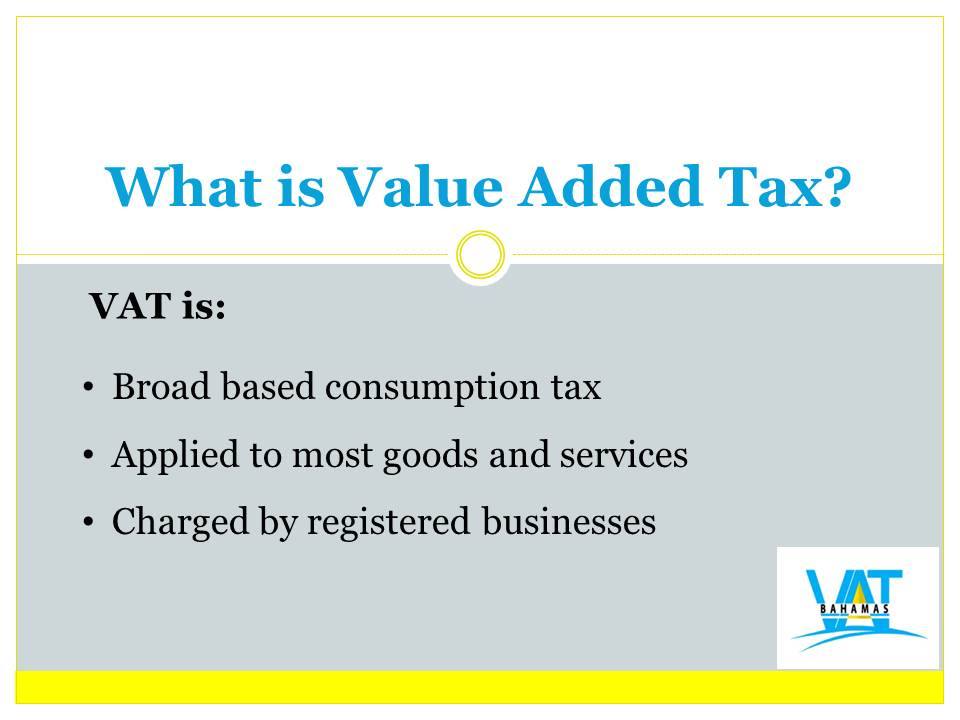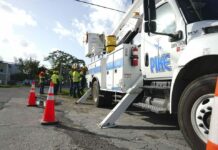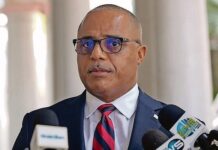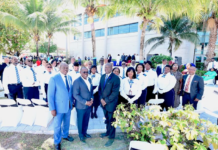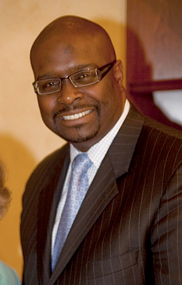
Nassau, Bahamas – Hon. Kenred Dorsett MP, Minister Of The Environment and Housing, Communication to Parliament on the Value Added Tax Bill Delivered on August 20th, 2014:
Thank You Mr. Speaker
I have the opportunity to rise in this place once again to make a contribution to matters of national importance because of the wonderful people of Southern Shores. Since I last spoke in this place we lost one of our long time residents, Mr. Cedric Curry. He was a spirited man with an amazing appetite for life. I attended his home going service a few weeks ago and would like to again extend my condolences to the family.
On a lighter note Mr. Speaker, the Southern Shores Back To School Extravaganza will be held this coming Saturday, August 23rd, beginning at 12 NOON on Percy Munnings Park located on Vendal Drive. I will be there and I personally invite all of the residents of Southern Shores to come out and partake in the fun. We will be distributing school supplies at this time and there will be lots of food and fun for the entire family.
Mr. Speaker
Change is not always an easy experience but it is a constant occurrence in life whether desired or not. Sometimes we must do what is necessary even when it is not what we want to do. The time has come once again for major change to come to The Bahamas, this change is the introduction of Value Added Tax (VAT) as part of the government’s tax reform initiative. Mr. Speaker, this government since assuming office in May of 2012 has been doing what is necessary, even in the face of criticism and opposition, to ensure that The Bahamas remains on the right track financially. We have been diligent in our efforts to curb spending while retaining service quality and employee levels. We have aggressively sought to revive Tourism, which is our number one industry, and to attract and expand investment projects to provide much needed jobs and entrepreneurial opportunities for our citizens. This is not an easy feat, it is a balancing act that we all on this side appreciate it weighs heavily on each of us but more so for the Right Honourable Member for Centreville who holds responsibility as the Prime Minister and the Minister responsible for Finance.
Mr. Speaker
We have stated in this place over and repeatedly the state in which we met the finances of this country. These statements were not just for cheap political points but it was essential that the people of this country understand how long the road to recovery would be given the depth from which we had to climb. It was important that the people were told exactly what we were dealing with and what steps we would have to take to remedy the situation. Under the leadership of the Prime Minister and Minister of Finance, the member for Centreville, our financial position has been improving. We are not at the place where we want to be as yet, but the policies that we have advanced to date to address the fiscal state of the country have borne fruit. We have not only seen improvements financially but the fact that over 8000 Bahamians have been able to find gainful employment under this administration is a clear indication that we are on the right track.
Mr. Speaker
For many decades, The Bahamas has relied on the revenue generated largely from customs duties. This along with other taxes and levies inclusive of Real Property Tax, Business Licensing Fees, Road Traffic Fees, Casino Tax, Hotel Room Tax and others represent the revenues upon which we sustain ourselves. Though these mechanisms serve their respective purposes in some regard, the Bahamas relies heavily on the ability to access credit from lending organizations in order to achieve certain infrastructural and service provision goals and too cover budget shortfalls at each budget cycle since memory serves. These methods are no longer sufficient to cover the cost of operating the Bahamas in the 21st century. The demands on the public purse from employees, essential services and debts service is too great. The time has now come that we must change and devise other revenue streams in order to service our debts and to continue to provide programmes and services to our people, particularly the least among us.
Mr. Speaker
We have just debated Constitutional reform and the national discussion in this matter will continue in the weeks and months ahead. Sometimes I think there are some among us that believe that it is their “constitutional duty” to avoid the payment of Customs Duties. Mr. Speaker, some of our people are bold about it. Sometimes you see and hear them on the plane and when they are in the departure lounges, talking about how they will use this invoice, hide this invoice. Mr. Speaker how could we sustain our country like that. How can we ensure that the Government is still able to subsidize housing? How can we continue to provide garbage collection without charging a fee like Freeport? How can we sustain and expand the social safety net programmes? How can we continue to provide free education for our people? The current model is not sustainable. We must find more efficient tax revenue. We must spread the tax base. We must restrain Government spending in a structured and practical way. We must expand the economy to include in large measure more ownership by Bahamians. We must advance energy reform and reduce the cost of Electricity. We must modernize government, streamline processes bring about efficiency and productivity for the delivery of public services. Mr. Speaker, we will do all of that and more! But we cannot do any of those things that I mentioned in a sustainable way, without tax reform.
Mr. Speaker
The Bahamas is a service based economy, as I stated earlier Tourism is our number one industry, followed by Financial Services and Construction. This being the case, it would seem peculiar that our current tax structure is heavily aimed toward the taxation of goods while virtually excluding services all together. This alone is a clear reason for tax reform and for the implementation of a tax system that would be more reflective of the economic realities which the Bahamas has. The government White Paper on Tax Reform says that service accounts for “60-70 percent of household expenditure.” It also states that the “current tax system captures a very small portion of the overall economy.” Value Added Tax, as we know, is a tax on consumption which will include goods and services. The inclusion of services into the tax equation alone will improve the government’s revenue and broaden the tax base. It will broaden our tax base Mr. Speaker! Something we desperately require.
Mr. Speaker
The Progressive Liberal Party foreshadowed tax reformation in our Charter for Governance. On page 59, it is states that, “a review of the tax system is critical because it:
_ is not progressive, i.e. persons who have most do not necessarily contribute most;
_ is too narrow, i.e. generally only taxing goods but not services;
_ is becoming increasingly more difficult and expensive to administer; and
_ is not sufficient to meet the financial needs of 21st century governance.
In keeping with this statement and the announcement of tax reform in the 2012/2013 budget, a White Paper on Tax Reform was released in February of 2013 in which the Prime Minister stated,
“the provision of programmes, services, and infrastructure by the Government is vital to the general welfare of the citizenry of The Bahamas and the orderly, progressive development of our nation. However, for this role of Government to be financially sustainable, it is incumbent upon citizens to conscientiously discharge their tax obligations to the state. This is the only way in which the government can, in turn, amass the necessary financial resources to meet its own obligations to the Bahamian people.”
These words are an honest summary of the obligation of citizenship in a developing nation such as the one we call home. Meeting this obligation of citizenship becomes even more important when home is an archipelago of many islands where essential services and infrastructural development must be multiplied many times over. Many of our islands need infrastructural improvements, many need airport construction or renovation, hospitals are needed, the list goes on and on. This in some instances is compounded by the size of the island where it may be ideal for essential services to be available in more than one location. I am sure the Members of this place who represent Family Island communities and even some who represent communities here in the capital can readily provide a list of needed works within their constituencies, but the sad reality is that the money is not available to do most of the things we wish and need to do.
Mr. Speaker
The Bahamas which you see today is not that of our grandfathers or grandmothers, who mostly lived off the land and walking was their main mode of transportation. No, this is The Bahamas of the 21st century, the information age, an age in which the demands of development, border protection and debt obligations, which must be met by the public purse, exceeds the current level of revenue generation. Just recently in order to secure our border more efficiently this parliament approved the purchase of boats for the Royal Bahamas Defence Force at a cost of some $232 million, a loan facilitated by Deutsche Bank. The previous administration sought and received permission from Parliament to carry out the New Providence Road Improvement Project which cost more than $200 million. The new Airport gateway came at a cost of some $70 million, if memory serves, a loan facilitated by the China Export Import Bank. These are a few examples of what is necessary to develop The Bahamas which we see today.
Mr. Speaker
We are at a time in our history where change is not a choice but a necessity. We can no longer kick the proverbial can down the road. All of us who sit in this place on both sides of the aisle must agree that this issue is not one that should become a political football but one that should be discussed rationally. The opposition has already taken the position that the PLP is hurting the poor which I guess is their latest plot to be on what they think is the right side of public opinion. However, this is about nation building and ensuring that we are doing what is best for the future of this country and the next generations. Both governments, this one and the former FNM administration were advised as regards the implementation of a Value Added Tax in order to broaden the country’s revenue base. It now falls on this PLP administration to carry out its implementation.
Mr Speaker
This is not being done haphazardly or in an ad hoc fashion, it is being done after more than a year of consultation and public education. We should all recall that the initial date for implementation was to have been July 1st, 2014. However after hearing the outcry from the people for an extension the Prime Minister and Minister of Finance, knowing the gravity of the change that is to come, extended the time to January 2015.
Mr Speaker
During the time since the initial announcement of Value Added Tax, the government has endeavored to ensure that all sectors of society including businesses, churches, schools, civic organizations and individuals alike were privy to the pertinent information of what to expect once VAT is implemented. The public education initiative has been long and far reaching with the use of town meetings, advertisements, brochures, social media and the government’s website. This was all in an effort to ensure that the Bahamian people were prepared for what is to come.
Mr Speaker
In his budget communication 2014/2015, the Prime Minister explained in detail the time line which has occurred in relation to tax reform and the implementation of Value Added Tax. This time line included much consultation with stakeholders, advice received and research conducted on the implementation of VAT in The Bahamas.
In his presentation, the Prime Minister stated that one of the reports which the government had received was the “Compass Lexecon study which concluded that a VAT is by far the superior new tax policy instrument for The Bahamas. A VAT provides the best combination of revenue generation, enforceability, efficiency, fairness and compatibility with economic growth. On the latter point this study is consistent with the vast international literature that ranks various instruments in respect to their so-called “friendliness” to growth, with VAT being a much better choice than personal and corporate income taxes and payroll taxes.”
This report was one of many done over the years and more significantly over the time period since the initial announcement of a Value Added Tax through the release of the government’s White Paper. It should be noted that the private sector also commissioned their own studies on the subject of VAT implementation. The Coalition for Responsible Taxation and the Bahamas Hotel and Tourism Association had studies done by companies they retained which was also mentioned in the budget communication.
Mr. Speaker
Consultation was also provided to us by the government of New Zealand, a country which has successfully been able to implement tax reform measures including Value Added Tax. Dr. Don Brash and Mr. John Shewan visited The Bahamas and held meetings with stakeholders including government officials and members of Cabinet. The gentlemen made several recommendations to the government. This government, taking into consideration all the information and advice which it has been given decided that VAT would be implemented on January 1st, 2015 at a flat rate of 7.5%. NOT 15%…7.5%. The bill which we now debate seeks to provide a legal framework for VAT.
Mr Speaker
The sentiments of doom and gloom that have been expressed is quite unfortunate. This government is not intentionally seeking to burden the average Bahamian. We are however, seeking to provide a solution to an age old problem which can no longer be allowed to persist. The Progressive Liberal Party is not a party that would do anything to adversely affect the Bahamian people, particularly the poor. This party was founded based on the need to free the masses from oppression. We do not now seek to oppress, if anything, the burdensome debt in which the country finds itself will oppress not only this generation but the next. What will happen to our great nation and our people should the government choose to let the status quo remain. In the last budget communication , it was explained by the Prime Minister that government debt interest stands at $260 million per year, with the national debt at a sum of slightly over $5 billion dollars or 60% of GDP. Though this administration has been able to reduce the GFS deficit since coming to office, this is not enough more revenue most be added to this equation. It is expected that some would be apprehensive given the major change the VAT represents, however this is why the public education exercise was advanced and the government was adamant that all sectors of society be involved in the national conversation on VAT. The education will continue and Bahamians must participate and come to understand the new regime.
Mr Speaker
It should be noted that Value Added Tax is but a part of the government’s overall effort to reform the tax regime of The Bahamas. There are other initiatives inclusive of the reformation of the Real Property Tax structure and ensuring operational efficiencies in the collection and administration of tax collection.
Mr. Speaker
This day was a long time coming as I am sure that all who have sat in this place at one time or another knew that The Bahamas would one day have to take an honest look at its tax structure because it clearly does not provide enough resources on which the government can operate. This is a step in the right direction but it is but one step and we must ensure that although we are doing what must be done, that The Bahamas benefits from these initiatives and that these reforms have the effect that we anticipate on the economy.
Mr Speaker
Over the time of consultative deliberations and even here in this debate, there have been arguments for and against implementing Value Added Tax. The more popular argument would be the effect this move will have on the less fortunate among us. Obviously we all in this place represent people and in some case those people are in need financially, but the fact is that this measure will affect us all and the common good must at all times be considered. However history will recall this moment, it will undoubtedly reflect that this government did what was thought to be the best thing for this country after exhaustive amounts of meetings, research, studies and receiving advice from countries which would have already and successfully gone through the process. Yes, we are making the tough decisions. We are not deferring it to any future government. We are addressing the matter head on. Those who come after us to this place may see fit to add taxes or further change or modernize taxes but for this generation and these who now hold the seat of government we are doing our part for the advancement of our country.
Mr. Speaker, Southern Shores unreservedly supports the Bill.


